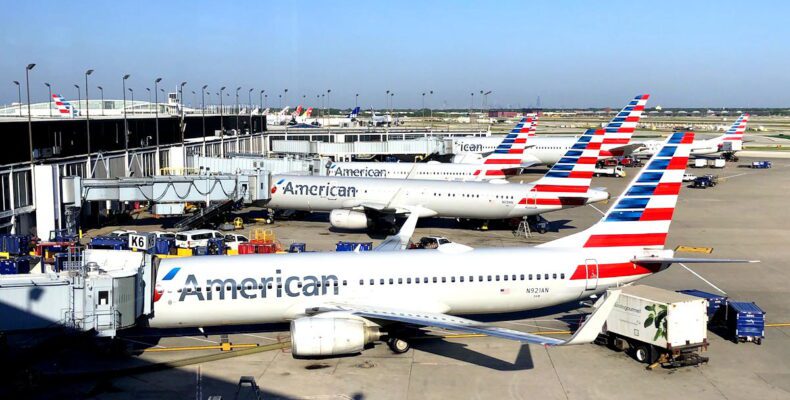American Airlines: Premium Aspirations Crumbling?
Here’s a juicy tidbit from the JP Morgan Conference! As we plunge into the mind of United CEO, Scott Kirby, there’s a generous serving of insider insight on the state of the airline game. Kirby, ever the chatterbox, offered his take on everything from potential JetBlue mergers to the quirky profitability of airline hubs.
But the real kicker came when Kirby addressed American Airlines’ aspirations of becoming—you guessed it—more “premium.” Considering American’s recent financial woes (tanked profits compared to Delta and United, anyone?), and their dreams of perched-up status in the high-flying world of premium air travel, one can’t help but ask—is their sky-high ambition realistic?
Kirby’s Two-Premium-Airline Theory
Poor Jamie Baker, the JP Morgan airline analyst. He found himself in the middle of Kirby’s grand visions. In their chat, Kirby waxed lyrical about his long-standing belief: the US can only host two premium airlines. No room for third wheels here!
It was a crisp December day back in 2013 when I first dropped the bombshell: ‘Only space for two top dogs in premium air travel. Spoiler alert—we’re one of them,’ I declared. We’d already concocted a devilish plan: win over United, elbow them out of the transcontinental race, followed by Los Angeles and Chicago.
This isn’t just a whim. I’ve always maintained that the real challenge isn’t being top dog but grappling for that second spot. Even New York’s sprawling scene could hardly juggle two major players. And while conquering markets like New York, Chicago, or Los Angeles is a feat in itself, being a dominant force across them? The odds aren’t great. We’re sticking to the tried and true: keep it just two.
Isom’s Rebuttal: Room for Three, Anyone?
Enter Robert Isom, the man at American Airlines’ helm, chancing upon Kirby’s view at the same cozy JP Morgan Conference. Clearly, the man was not enamored with Kirby’s two-airline monopoly idea:
Scott’s got a habit of shooting his mouth off, but this is one instance where he’s way off the mark! American’s seen its share of rough patches, sure. Remember the pandemic pilot pinch with 200 planes grounded? Yeah, not our finest hour.
But don’t write us off just yet—we’re bouncing back with a fleet that’s to die for. Growth has been steady from Charlotte to Val Seny ski resort, and we’re carving out a premium niche in the coveted sunbelt territory. With stalwarts like Iberia and BA, our alliances are rock-solid. To wrap it up, American isn’t budging!
My Spin on Kirby vs. Isom
So, as we sit back with popcorn in hand, it’s hard not to be enthralled by this corporate spat. Kirby’s thesis is rooted in domination over key markets like New York; thus, American can’t claim premium status without a foothold in the biggest cities.
Isom, on the other hand, seems to veer off pointedly. Sure, he chats about their impressive fleet, expanding footprint, and knockout sunbelt hubs. But how’s any of that premium? His conclusion seems to border on wishful thinking—claiming anyone underestimating American is simply scared stiff!
What’s my two cents? Defining “premium” is a debate as old as time itself. But for airline bosses, you bet bottom dollar profitability is king, and the road to riches seems paved with luxury services and high-end niches.
In truth, can American leapfrog United and Delta to the top-money club? The odds aren’t exactly stacked in American’s favor, here’s why:
- American’s eastern strategy hasn’t nailed it, falling short in capturing New York’s spirit, and it waved the white flag on being LA’s top carrier.
- Their domestic bias leaves its long-haul network floundering; they can’t hold a candle to United’s international game plan.
- Let’s not gloss over their service ups and downs, lackluster business traveler outreach, or aircraft interiors light years away from competitive.
Parting Thoughts
Scott Kirby, the man on the United throne, firmly believes the market’s too small for more than a duo of premium carriers. This belief was birthed at American in the wake of the US Airways merger—a bid to craft a kicker of a premium airline. But alas, it fizzled out. Upon switching allegiances to United, his mission remained unchanged: join the top two league.
Kirby’s notion rests on snagging top spots in city hubs like New York, while American’s tricky trajectory doesn’t promise such growth. Robert Isom might beg to differ, but let’s face it, his case doesn’t hold water.
So, what do you make of Kirby’s audacious comments on American morphing into a premium titan?
